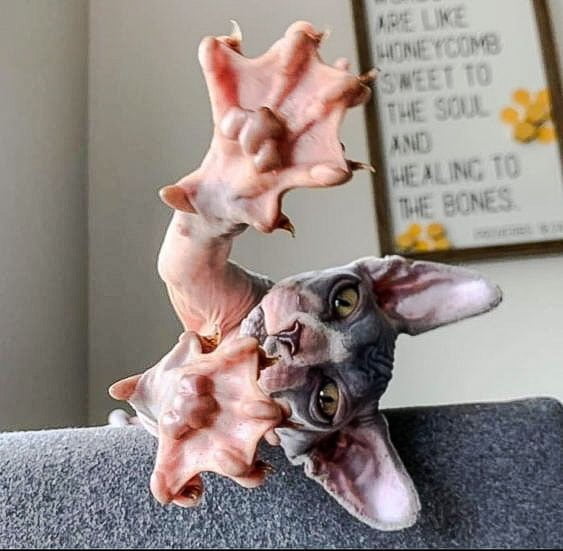When you think of cats, you might picture them as agile hunters, graceful climbers, and cozy companions. But have you ever considered the unique features that some cats possess, such as webbed feet? While most felines have the typical paw structure we are familiar with, certain breeds exhibit this fascinating trait, which adds an intriguing layer to their biology and behavior. Cats with webbed feet are not just a curiosity; they exemplify nature's adaptability and the diversity within the feline family.
Webbed feet in cats are a rare phenomenon, but they can be found in specific breeds that have evolved to thrive in particular environments. These adaptations can aid in swimming, provide stability, or enhance their ability to navigate different terrains. Understanding the significance of webbed feet in cats opens up a world of exploration into feline evolution and the unique characteristics that these animals possess. Moreover, it highlights the importance of breed-specific traits and how they shape a cat's lifestyle and behavior.
In this article, we will delve into the world of cats with webbed feet, exploring the breeds that exhibit this trait, the reasons behind it, and how it influences their daily lives. Whether you are a seasoned cat owner or simply a feline enthusiast, you will find the information both enlightening and entertaining as we uncover the fascinating world of these unique cats.
What Breeds of Cats Have Webbed Feet?
Several cat breeds are known for having webbed feet. Among them are:
- Savannah Cats: This exotic breed is known for its striking appearance and is a hybrid between a domestic cat and a serval. They often have webbed feet, which aids in their agility and movement.
- Bengal Cats: Bengals are known for their wild appearance and energetic nature. Some Bengals possess slight webbing between their toes, which can assist in swimming.
- Maine Coons: One of the largest domesticated cat breeds, Maine Coons have tufted paws that can sometimes appear webbed, helping them navigate snowy environments.
- Sphynx Cats: While they lack fur, Sphynx cats can display webbed feet, which is a result of their unique genetic makeup.
Why Do Some Cats Have Webbed Feet?
The presence of webbed feet in cats primarily serves a functional purpose. Several factors contribute to the evolution of this trait:
- Swimming Ability: Some cat breeds, like the Bengal and Savannah, have developed webbed feet to assist with swimming, making them more efficient in water.
- Stability: Webbed feet can provide better balance and stability, especially for larger breeds like the Maine Coon, which helps them navigate their environment with ease.
- Hunting Skills: The webbing can help certain breeds in hunting by allowing them to move swiftly through various terrains, be it water or mud.
Are Webbed Feet Common in Cats?
While webbed feet are an interesting trait, they are not common across all cat breeds. The majority of domestic cats do not exhibit this feature. However, in breeds that do have webbed feet, it is often a subtle characteristic rather than a pronounced one. The degree of webbing can vary significantly from cat to cat, making it a unique aspect of their physical makeup.
How Do Webbed Feet Affect a Cat's Behavior?
Webbed feet can influence a cat's behavior in various ways:
- Enhanced Mobility: Cats with webbed feet may find it easier to traverse through water or mud, making them more adventurous and exploratory.
- Playful Nature: These cats often enjoy playing in water, which can be attributed to their natural swimming abilities.
- Improved Hunting Techniques: The added stability from webbed feet can enhance their agility, making them more effective hunters.
Do Webbed Feet Require Special Care?
Cats with webbed feet do not require specific care solely because of their webbing. However, here are some considerations for owners:
- Regular Check-ups: Ensure that their paws are free from debris, especially if they enjoy outdoor activities.
- Grooming: Regular grooming is essential for all cats, but pay special attention to the areas between the toes, as it can trap dirt or moisture.
- Watch for Injuries: Cats with webbed feet may be more prone to certain injuries when swimming or exploring, so monitor their activities.
Can All Cats Swim?
While not all cats have webbed feet, many cats can swim if they need to. However, their level of comfort and ability in water can vary widely. Factors influencing this ability include:
- Breed: Breeds with webbed feet tend to be more comfortable in water.
- Individual Preference: Some cats may naturally enjoy water, while others may avoid it entirely.
- Early Exposure: Cats that are introduced to water at a young age may develop a more positive attitude towards swimming.
Conclusion: The Fascinating World of Cats with Webbed Feet
Cats with webbed feet are a unique and interesting subset of the feline world. Their adaptations not only contribute to their physical capabilities but also enhance their behavior and interaction with their environments. Understanding these remarkable traits helps us appreciate the diversity within the domestic cat population. Whether you're a cat lover or simply curious about feline characteristics, the phenomenon of webbed feet in cats invites us to explore the wonders of nature and evolution.
As we continue to learn about these breathtaking creatures, we can celebrate the variety of traits that make each breed special. From their playful nature to their extraordinary adaptations, cats with webbed feet remind us of the beauty and complexity of the animal kingdom.
Exploring The Talented Ullu Star Cast Male: A Closer Look
Unveiling The Connection Between Josh Ball And Angela Aguilar
Discovering Walt Disney's Final Resting Place: Where Is Walt Disney's Gravesite?


